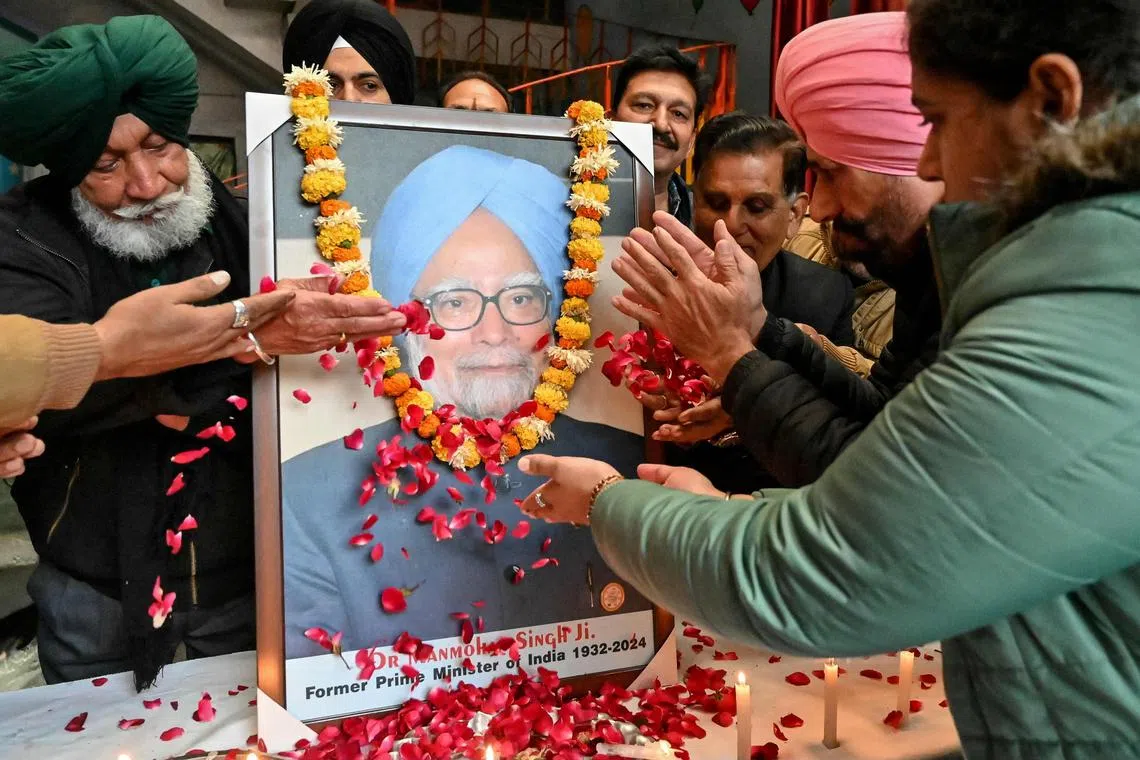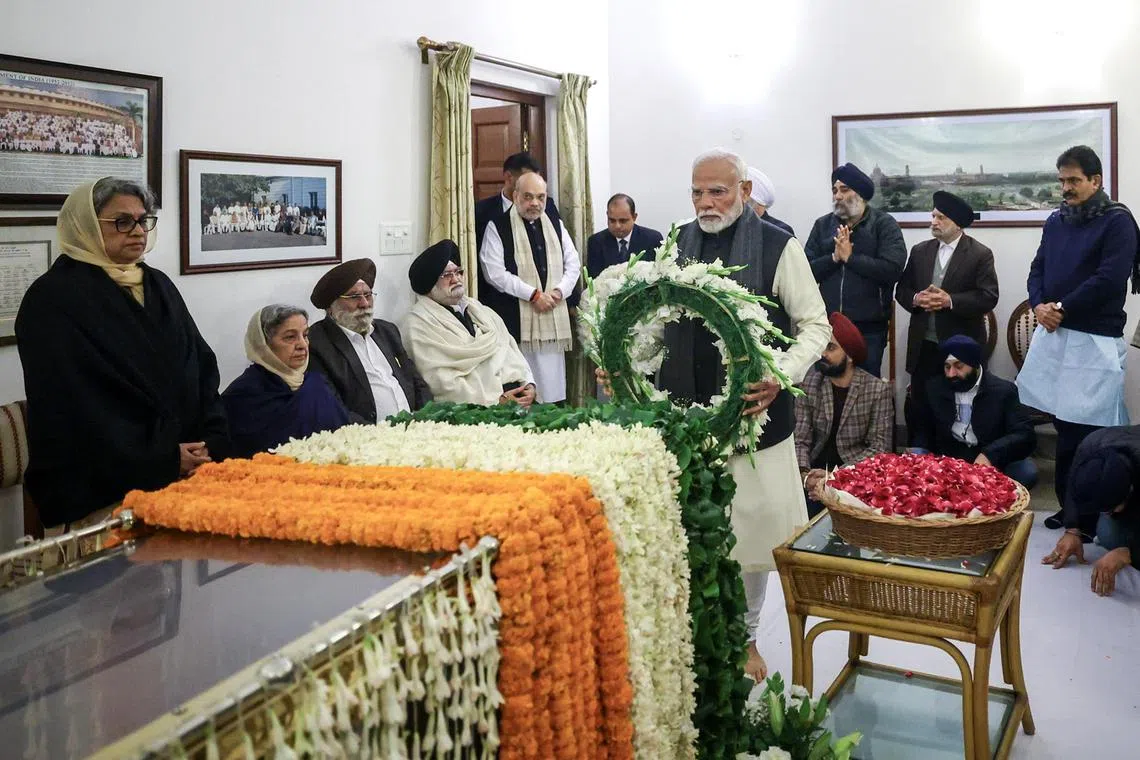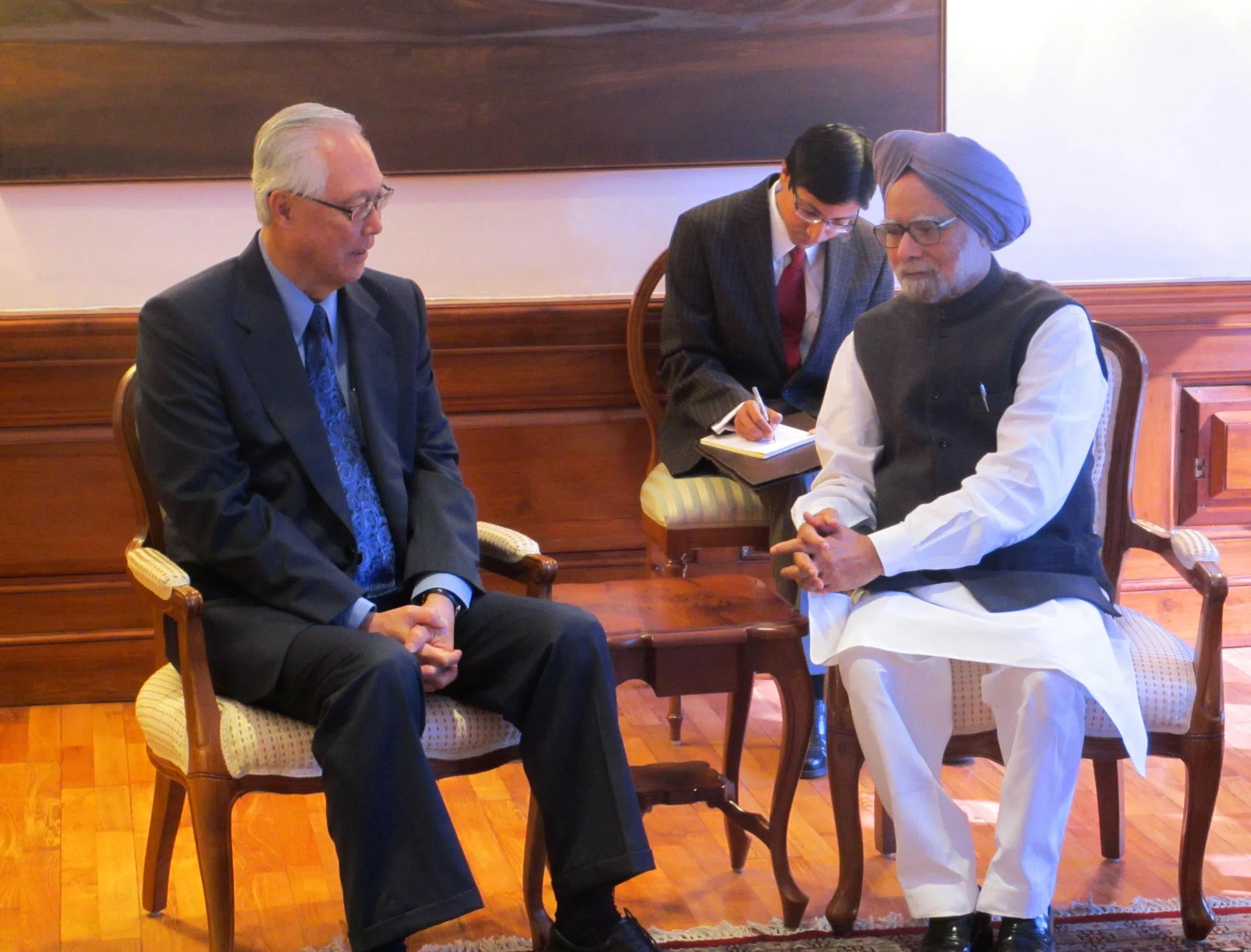India declares 7 days of mourning, state funeral for Manmohan Singh – force behind economic reforms
Sign up now: Get insights on Asia's fast-moving developments

Congress party members paying homage to India's late former prime minister Manmohan Singh, in Amritsar on Dec 27.
PHOTO: AFP
Follow topic:
NEW DELHI – India on Dec 27 announced seven days of state mourning till Jan 1 for former prime minister Manmohan Singh, who died in Delhi on Dec 26, aged 92.
He will be accorded a state funeral in Delhi on Dec 28.
Tributes have poured in for Dr Singh, who is acknowledged as the key architect of economic reforms which opened up India’s economy in the 1990s and steered it out of a crippling balance of payments crisis.
India’s current Prime Minister Narendra Modi said on X that Dr Singh had left “a strong imprint on our economic policy” and “made extensive efforts to improve people’s lives”.
Leader of the Opposition and member of Dr Singh’s Congress party Rahul Gandhi likewise paid homage to him, saying that Dr Singh’s “humility and deep understanding of economics inspired the nation”. “I have lost a mentor and guide,” he added on X.
His mother, Ms Sonia Gandhi, also a Member of Parliament and former Congress president, said Dr Singh’s death was a “deeply personal loss” and described him as a “friend, philosopher and guide”. “He was so gentle in his manner but so resolute in his deeply held convictions,” she added in a statement.
Dr Singh was admitted to a Delhi hospital after he lost consciousness
The first person from India’s minority Sikh faith to hold the prime minister’s office, Dr Singh served as India’s prime minister from 2004 to 2014, a decade which saw millions lifted out of poverty and India’s global stature rising.
He was the first Indian leader since Jawaharlal Nehru, independent India’s first prime minister, to be re-elected as prime minister after having served a full first five-year term. His victory, which came in 2009, was widely credited to his deft handling of the economy, which shielded India from the 2008 global economic crisis.
His second term in office was, however, tainted by several corruption allegations that led to his Congress party’s defeat by Mr Modi’s Bharatiya Janata Party in the 2014 general election. Economic growth also slackened during Dr Singh’s second stint, amid global economic headwinds and slow decision-making by his divided Congress-led government.
A child of pre-Partition India, Dr Singh was born on Sept 26, 1932, in Gah, a village in what is now Pakistan and from which his family migrated to India during the Partition in 1947.
It was said he could not read the Devanagari script that Hindi is written in, and that his Hindi speeches were instead rendered in the Perso-Arabic script used for Urdu, which he learnt as a child in school.
Born into a poor family, Dr Singh studied by the light of a kerosene lamp at night and excelled at school, going on to read economics at Cambridge University. Upon graduation in 1952, he headed to Oxford University, where he earned a doctorate in 1962 researching the role of exports and free trade in India’s economy.
Dr Singh worked as an economics professor at the University of Delhi and served in multiple positions, including as the governor of the Reserve Bank of India between 1982 and 1985, and as deputy chairman of the Planning Commission, which formulated the country’s five-year plans, from 1985 to 1987, before joining politics.
He was the chairman of the University Grants Commission, a statutory body in India that oversees and promotes higher education, in 1991, when he was asked by then Prime Minister and Congress leader P.V. Narasimha Rao to serve as the country’s finance minister.
Dr Singh used his deep economic knowledge to rev up India’s economic growth, first as its finance minister and then as prime minister, combining growth with welfarism through measures such as the acclaimed rural employment guarantee scheme, which provides at least 100 days of assured paid employment in a year. A social safety net for the country’s rural poor, it is still in place today.

Indian Prime Minister Narendra Modi (centre) laying a wreath as he pays his respects to later former prime minister Manmohan Singh, in New Delhi, on Dec 27.
PHOTO: EPA-EFE
Mr Rasheed Kidwai, a senior political commentator, said Dr Singh was an economist “who had his heart in the right place”. “He followed a policy of economic right and social left,” he told The Straits Times.
“He was committed to economic reforms, but he also spent a lot of surplus money that India had due to these reforms on helping the poor. The sort of welfarism that Mr Modi seems to have perfected has its roots in Manmohan Singh’s thinking and action,” he said.
Erudite and soft-spoken, Dr Singh was often referred to as India’s “reluctant” or “accidental” prime minister after he stepped into the role in 2004 when then Congress president Sonia Gandhi refused to become prime minister.
This led to a unique power-sharing arrangement between the two, said Ms Neerja Chowdhury, a veteran journalist, whereby Ms Gandhi would take political decisions and Dr Singh would look after governance and administration.
“But this kind of a division is very difficult, especially for a PM not to have a political role,” she told ST, adding that Dr Singh went on to be “seen as a weak prime minister, because Sonia Gandhi was half-PM”.
But he was no pushover, and stood his ground when needed. This was the case during the 2008 Indo-US nuclear deal, which lifted a decades-long moratorium on nuclear trade between the two countries. Many say this period marked one of the high points in his leadership.
Dr Singh went ahead with the deal despite opposition from Ms Gandhi and the left-wing parties that were part of his governing coalition. A consensus-builder, he managed to cobble together support from regional parties and saved his government when the Left Front eventually withdrew its support over the deal.
Ms Chowdhury said the Indo-US nuclear deal was a situation wherein Dr Singh “exerted power as a PM should”. “He showed a tenacity and a determination, a political killer instinct that did not manifest itself in any other decision. That was the only place where he was his own man,” she added.
It was also Dr Singh who apologised publicly in Parliament in 2005 for the 1984 anti-Sikh riots that took place while the Congress party was in power and which killed more than 3,000 people, something an American diplomatic cable described as a “singular act of political courage”.
During his decades-long political career, Dr Singh contested elections for the Lok Sabha – the Lower House of the Indian Parliament – only once in 1999 and lost. He was, however, elected multiple times to the Upper House, to which representatives are elected by state assembly members.
The well-read and scholarly Dr Singh often quoted famous authors in his speeches. In 1991, in his maiden speech as finance minister, he quoted Victor Hugo, saying that “no power on Earth can stop an idea whose time has come” to refer to India’s rise as an economic power.
Then in 2005, when confronted by protesting students in Delhi critical of his economic policies, he invoked Voltaire’s defence of free speech to say that “I may disagree with what you have to say, but I shall defend, to the death, your right to say it”.
Dr Singh also played an important role in shaping India’s ties with Singapore. Dr T.C.A. Raghavan, a former Indian diplomat who served as the country’s high commissioner to Singapore from 2009 to 2013, said Dr Singh “genuinely admired” the Singapore leadership and “their scale of achievement”.
It was also during Dr Singh’s first term in office that Singapore and India signed the Comprehensive Economic Cooperation Agreement in 2005.
Singapore’s Emeritus Senior Minister Goh Chok Tong said in a Facebook post that he was saddened by Dr Singh’s death. “I met him many times over the years, first when he was finance minister, later when he became prime minister, and after he had retired. Dr Singh was a wise yet humble man of principles,” he wrote.
“We both believed that India should be a key pillar of growth within a rising Asia. Dr Singh was also a good friend of Singapore,” ESM Goh, who was Singapore’s prime minister from 1990 to 2004, said, adding: “I have the highest regard for him.”

A 2013 photo shows Mr Goh meeting Dr Singh during a four-day visit to India.
PHOTO: MINISTRY OF FOREIGN AFFAIRS
Dr Raghavan also recalled that during Dr Singh’s visit to the island-nation in 2011, the government of Singapore demonstrated its regard for India and Dr Singh. “One of the things which was done, for instance, was installing a marker and a bust of Jawaharlal Nehru at the Asian Civilisations Museum. It was a very nice touch.”
Ms Priyanka Kishore, principal economist at Asia Decoded, an economics consultancy, added that Dr Singh’s decision to liberalise India’s economy and welcome foreign investment “set the stage for deeper economic ties between the two nations over the years”.
“He (also) recognised Singapore as a key partner in the region, with a critical role in fostering stronger India-Asean relations,” she said.
Social media in India was flooded with tributes to Dr Singh. Among the many viral posts was footage from his last press conference as prime minister on Jan 3, 2014.
When asked to react to criticism that he was a “weak PM”, Dr Singh said that “history will be kinder to me than the contemporary media or, for that matter, the opposition parties in Parliament”.
In his final years, Dr Singh often criticised Mr Modi’s economic policies and warned about India’s rising communal tensions.
In a piece in 2022 for The Hindu newspaper to mark 75 years of Indian independence, Dr Singh wrote that “we must resolve to never let our freedoms be robbed by authoritarian arrogance or allow fomented hatred to undermine the unity of the Indian people. That is the best tribute we can pay to our flag”.
Debarshi Dasgupta is The Straits Times’ India Correspondent, covering the country as well as other parts of South Asia for the paper.
With additional reporting by Clement Tan in Singapore


